Introduction
The Aztec Empire was a formidable force in ancient Mesoamerica, renowned for its military prowess and technological innovations. At the heart of their fearsome arsenal was a unique and ingenious weapon – the macuahuitl. This remarkable tool combined the brute force of a club with the precision of a sword, creating a devastatingly effective combat instrument.
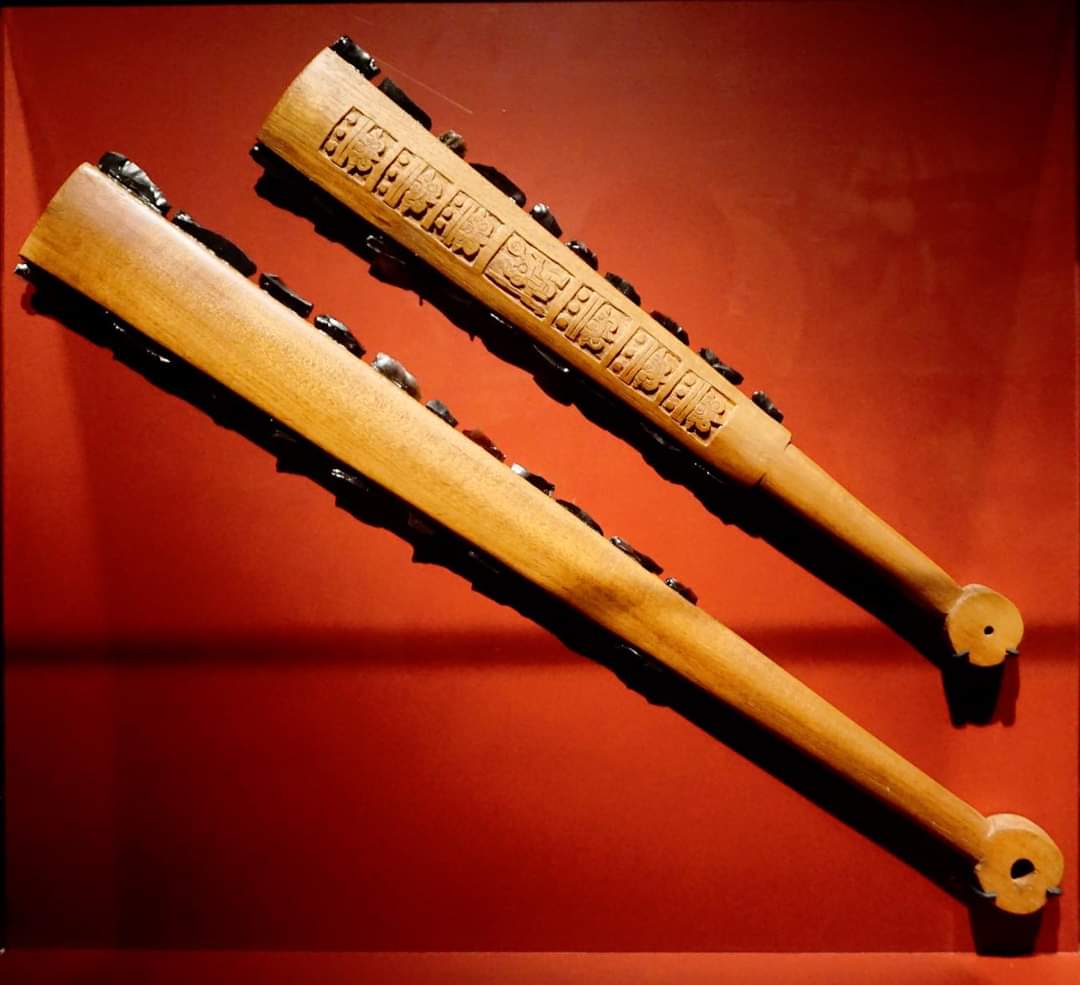
Crafted from sturdy wood and embedded with razor-sharp obsidian blades, the macuahuitl was a true marvel of Aztec engineering. Its legendary status has endured through the centuries, but the physical presence of this ancient weapon is now exceedingly rare. Many original examples were lost or destroyed during the Spanish conquest of the Aztec Empire, leaving us to rely on historical accounts and the few surviving specimens to piece together the story of this formidable tool of war.
In this blog post, we’ll delve into the fascinating history and design of the macuahuitl, exploring its role in Aztec warfare and its enduring legacy as a symbol of the cultural richness and military prowess of this ancient civilization.
The Anatomy of the Macuahuitl
The macuahuitl was a truly unique weapon, unlike anything seen in the rest of the ancient world. At its core, it was a wooden club, typically measuring between 3 to 5 feet in length. However, this was no ordinary club – its defining feature was the rows of razor-sharp obsidian blades that were embedded along the sides of the wooden base.
The obsidian used in the macuahuitl’s construction was a volcanic glass known for its exceptional sharpness, capable of producing cuts even finer than modern surgical scalpels. These blades were carefully crafted and secured into grooves carved into the wooden club, creating a formidable cutting edge that could slice through flesh and bone with devastating efficiency.
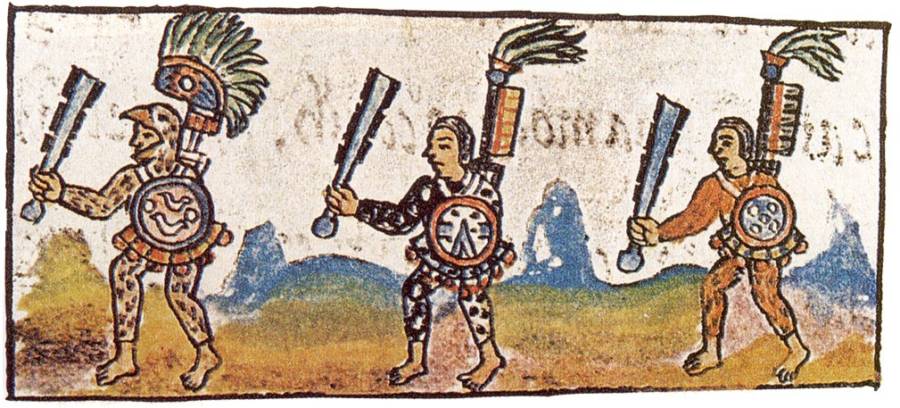
The number of obsidian blades varied, with some macuahuitls featuring as few as four or five, while others boasted up to 50 or more. The more blades, the more devastating the weapon’s cutting power, but the added weight and complexity also made it more unwieldy and difficult to wield effectively.
In addition to its primary cutting edges, the macuahuitl also featured a blunt wooden end, which could be used to bludgeon opponents in a manner similar to a traditional club. This dual functionality allowed Aztec warriors to adapt their fighting style to the specific needs of each combat situation, making the macuahuitl a truly versatile and formidable weapon.
The Deadliness of the Macuahuitl
The macuahuitl’s combination of cutting power and bludgeoning force made it a truly fearsome weapon on the battlefield. Spanish accounts from the conquest of the Aztec Empire are filled with vivid descriptions of the weapon’s devastating effects, though some of these stories may have been exaggerated or embellished over time.
One of the most frequently cited anecdotes comes from the Spanish conquistador Bernal Díaz del Castillo, who described witnessing a macuahuitl-wielding Aztec warrior effortlessly slice off the head of a Spanish horse with a single blow. While the veracity of this specific claim is difficult to verify, it does speak to the immense cutting power of the weapon and the terror it must have inspired in the ranks of the Spanish invaders.
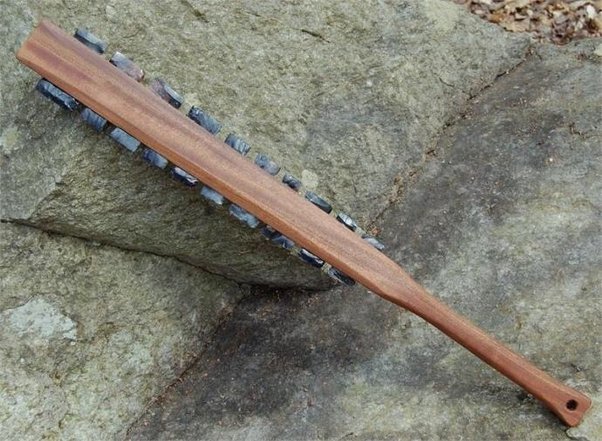
Other accounts describe the macuahuitl’s ability to cleave through armor and shields, leaving gaping wounds in its wake. The sharp obsidian blades were capable of slicing through even the toughest materials, making them a formidable threat against the steel swords and armor of the Spanish conquistadors.
Beyond its physical destructiveness, the macuahuitl also had a psychological impact on the battlefield. The sight of this fearsome, tooth-like weapon must have been a daunting prospect for any opponent, and the knowledge of its deadly capabilities likely struck fear into the hearts of those who faced it in combat.
The Decline of the Macuahuitl
Despite the macuahuitl’s legendary status and its crucial role in Aztec warfare, the physical presence of this ancient weapon is now exceedingly rare. The reasons for this scarcity are multifaceted, but largely stem from the perishable nature of the materials used in its construction and the devastating impact of the Spanish conquest.
The wooden base of the macuahuitl was susceptible to the ravages of time and the elements, making it difficult for these weapons to survive intact over the centuries. Additionally, many original examples were likely lost or destroyed during the Spanish invasion of the Aztec Empire, as the conquistadors sought to eradicate the symbols of their enemy’s military might.
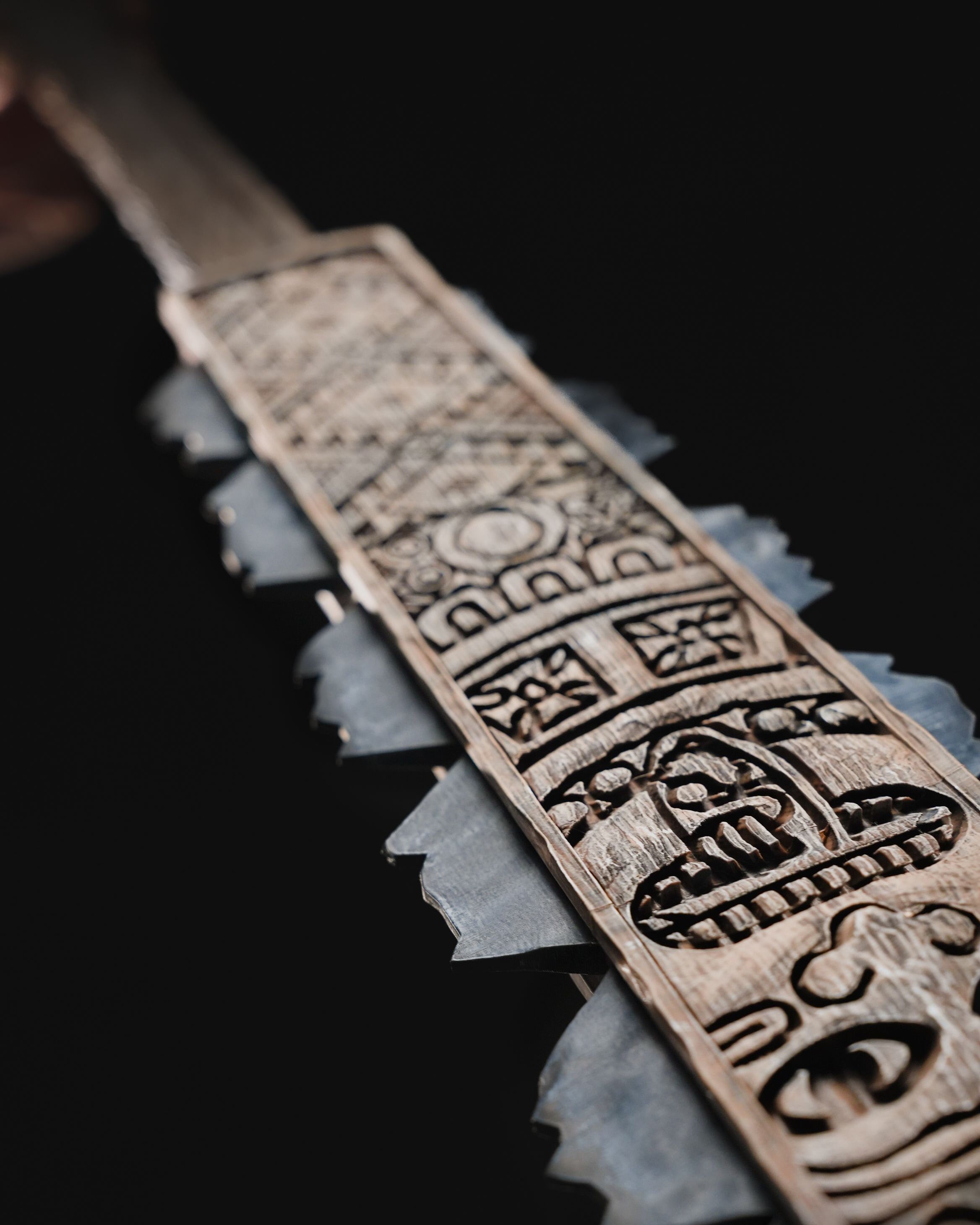
Furthermore, the obsidian blades embedded in the macuahuitl were highly prized for their utility in other applications, such as tool-making and ritual practices. It’s possible that some of these valuable obsidian fragments were removed from the weapon’s wooden frame and repurposed, further reducing the number of complete, intact macuahuitls that have survived to the present day.
As a result, only a handful of original macuahuitls are known to exist in museum collections and private holdings around the world. These rare specimens provide a tangible link to the ancient Aztec civilization and offer a glimpse into the technological and cultural sophistication of this remarkable people.
The Enduring Legacy of the Macuahuitl
Despite the scarcity of physical evidence, the macuahuitl remains a powerful symbol of ancient Mesoamerican warfare and the military prowess of the Aztec Empire. Its unique design and fearsome reputation have captured the imagination of historians, archaeologists, and the general public alike, ensuring that the legacy of this ancient weapon endures.
In the modern era, the macuahuitl has been the subject of extensive research and experimentation, as scholars and enthusiasts seek to better understand its construction, capabilities, and historical significance. Through careful analysis of the few surviving specimens and the detailed accounts left by Spanish chroniclers, researchers have been able to reconstruct the design and functionality of this remarkable weapon, shedding new light on its role in Aztec military tactics and the broader context of Mesoamerican warfare.
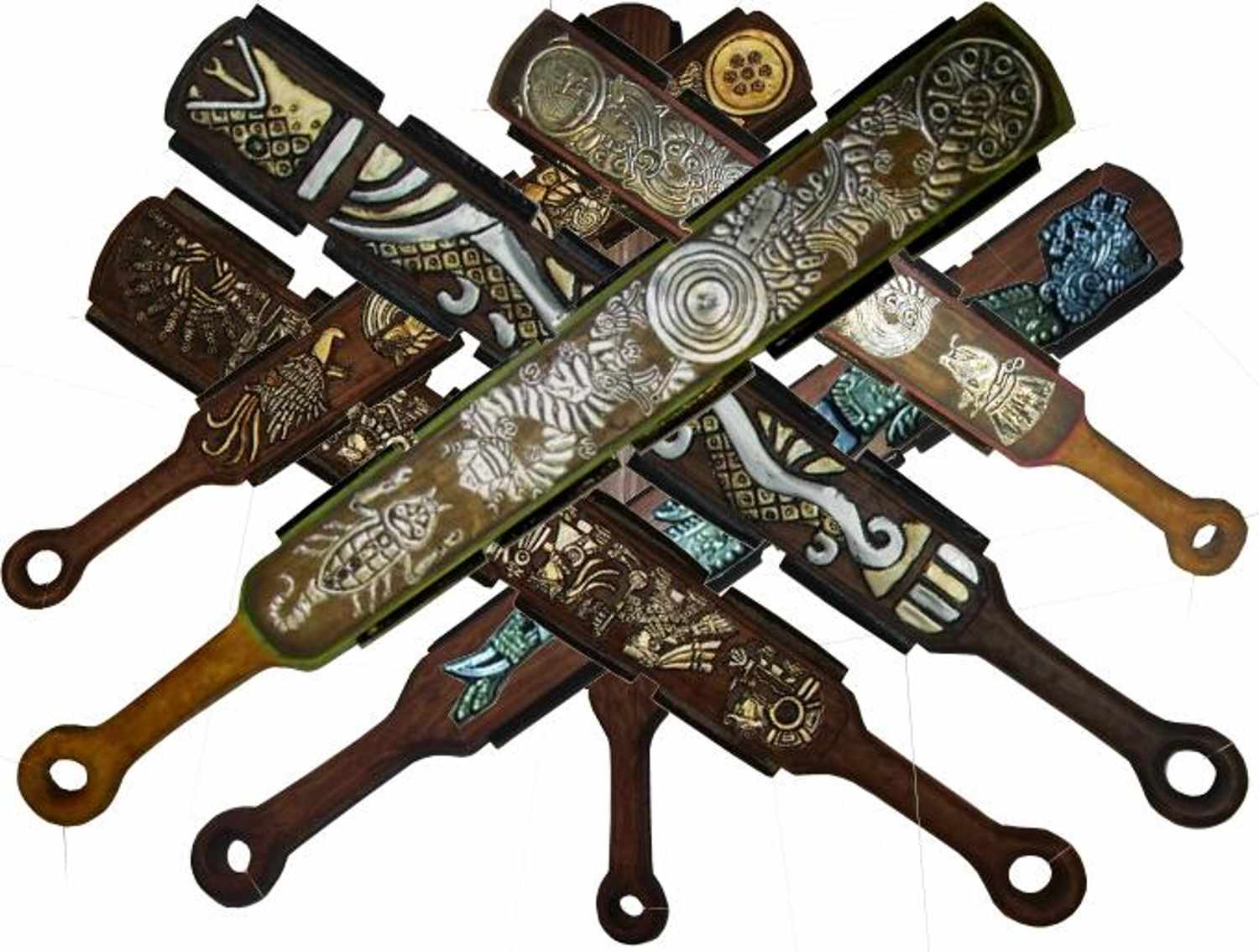
Beyond its practical applications, the macuahuitl has also become a potent symbol of Aztec cultural identity and resistance against colonial oppression. In the aftermath of the Spanish conquest, the weapon’s image was often used to represent the enduring spirit and ingenuity of the Aztec people, who refused to be defined or limited by the tools of their conquerors.
Today, the macuahuitl continues to capture the public imagination, appearing in popular media, historical re-enactments, and even modern art installations. Its unique design and fearsome reputation have made it a compelling subject for scholars and enthusiasts alike, ensuring that the legacy of this ancient Aztec weapon will continue to be studied and celebrated for generations to come.
Conclusion
The macuahuitl, with its combination of brute force and surgical precision, was a true marvel of Aztec engineering and a formidable weapon on the battlefield. Despite the scarcity of physical evidence, the legacy of this ancient tool lives on, serving as a powerful symbol of the military prowess and cultural richness of the Aztec civilization.
As we continue to explore and unravel the mysteries of the macuahuitl, we gain a deeper understanding of the technological innovations and cultural complexities that defined the Aztec Empire. This ancient weapon stands as a testament to the ingenuity and adaptability of the Aztec people, who were able to create a tool that was both deadly and versatile, capable of striking fear into the hearts of their enemies.
The macuahuitl’s enduring legacy serves as a reminder of the rich cultural and technological heritage of Mesoamerica, and the importance of preserving and studying the artifacts and accounts that have survived the passage of time. By delving into the history and significance of this remarkable weapon, we not only honor the memory of the Aztec people, but also gain valuable insights into the broader tapestry of human civilization and the remarkable feats of engineering and innovation that have shaped our world.

